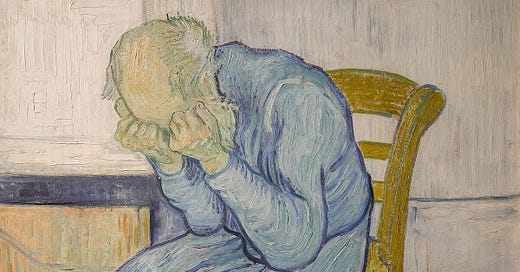1. you are an unreliable narrator
reaching a point where “wow you’re so self aware” is no longer the compliment it used to be years ago, when going to therapy warranted a cookie. in the bubble we’re in (yes you’re in it, if you’re reading this), everyone’s doing self work and self growth is the norm but therapy-speak has snuck in!
It’s not that I don’t have feelings. I do. In fact, I have an entire catalogue of them. I just prefer to curate them. To run them through a filter. I want to feel my emotions like you might watch a storm from the safety of a porch: visible, narratable, but never threatening to soak you through.
I’ve become adept at this kind of elegant dissociation. I can name my fear of abandonment while smiling politely. I can identify self-destructive patterns and then offer a footnote about their Freudian implications. I can say “I think that made me feel deeply rejected” in the same tone I use to order an iced chai. I have turned my emotional life into a case study and myself into its most diligent researcher.
fun piece on what happens when you intellectualise your feelings because you’re so self-aware, but haven’t yet learnt to do the real work1 of experiencing the vulnerable mess that comes with feeling more, instead of less.
2. so what caused your depression?
it’s difficult writing about one’s depression, the act itself so self-indulgent and sometimes the story you tell is self-defeating in the journey to “get better”2. i re-stumbled upon this really old (but gold) piece from a decade ago. rings painfully true, still. such a brief, powerful essay about a man’s analysis of what ‘caused’ his depression, and it’s… ding ding ding, social power structures. it’s about your own sense of your worth, and ‘place’ in the world, and whether you are worthy of the space you take in the world.
CLICK HERE: Good for Nothing in The Occupied TimesSomeone who moves out of the social sphere they are ‘supposed’ to occupy is always in danger of being overcome by feelings of vertigo, panic and horror: “…isolated, cut off, surrounded by hostile space, you are suddenly without connections, without stability, with nothing to hold you upright or in place; a dizzying, sickening unreality takes possession of you; you are threatened by a complete loss of identity, a sense of utter fraudulence; you have no right to be here, now, inhabiting this body, dressed in this way; you are a nothing, and ‘nothing’ is quite literally what you feel you are about to become.”
3. you’re grieving and feel left behind
a soft tender piece i quite enjoyed reading this week. captures the messy & hard journey of feeling grief and pain and sorrow, while the world moves on.
Life’s refusal to stop for our pain is not a punishment.
It is the mechanism of our healing.It doesn’t ask you to be ready.
It doesn’t demand you be okay.
It simply carries you forward, inch by stubborn inch, until one day you wake up and realize you are not quite the same person who broke apart all those lifetimes ago.
4. we’re lonely & doomed, aren’t we?
this is a good piece that tracks the evolution of what we now come to understand as the modern-day version of loneliness. much about the world makes it feel like an inevitable outcome - phone addictions, isolated family structures, dwindling community or religious groups, and political polarisation. tons of studies that prove a lack of “meaningful connection”3 being the biggest driver of distress.
this is an optimist’s case that perhaps this is a learning phase in our evolutionary journey, and humanity will reframe and reconfigure what connection & community looks like & feels like.
Squint, and you can see it: a scenario in which the loneliness crisis today is really a mass period of acclimatization. It’s a bridge, an evolutionary step, during which we make our peace with certain trade-offs and realities — that in 2024, we’re not all going to race to rejoin the local grange. That we’re not all going back to church or temple or the mosque. That our kids may grow up far from their grandparents and aunts and uncles — far from the towns where we were raised. That the workplace will remain diffuse, tethered by Zoom meetings and the occasional in-person happy hour. That we may often see friends more on FaceTime than we do in real life. And most important, that despite it all, we’ll find one another again.
CLICK HERE: Why is the Loneliness Epidemic So Hard to Cure?, in the NYT5. “joy is not made to be a crumb”
mary oliver coming through with what needs to be a mantra for all of us. what do we really know, on a day to day basis, you know? we’re not that smart, or wise, or compassionate. so perhaps, lean in. “give in to it”.
i’m glad to be pushing out this edition of substack amidst a period of mayhem in life because if i can do this, then i can definitely tackle the 23 other items on my todo list amirite?
until next time & new reads!
🌻
~ rufus
OR, hear me out, you could become addicted to racquet sports and use that as an emotional crutch!
if my Notes app from peak depression year were ever compiled & leaked, i’d have to kill myself (jk! it’s funny when i say it!)
a lot of what we’ve learnt in the pursuit of ‘good’ mental health (e.g. boundaries, space, unmet needs, labelling others) is what’s often coming in the way of us being able to build connections - and perhaps the next wave of ‘good’ mental health hygiene will be unlearning some of it








![r/Poetry - [POEM] Don't Hesitate - Mary Oliver r/Poetry - [POEM] Don't Hesitate - Mary Oliver](https://substackcdn.com/image/fetch/$s_!qfar!,w_1456,c_limit,f_auto,q_auto:good,fl_progressive:steep/https%3A%2F%2Fsubstack-post-media.s3.amazonaws.com%2Fpublic%2Fimages%2Fad09f078-e67d-4810-aea6-32a19b786b9c_640x865.png)